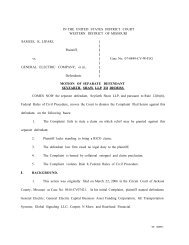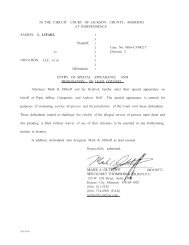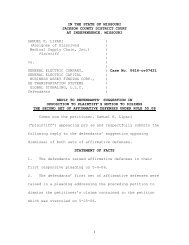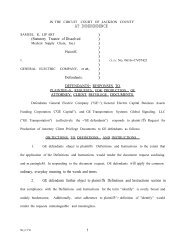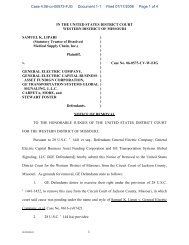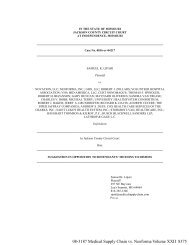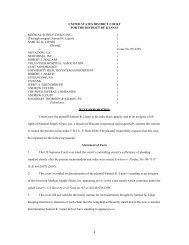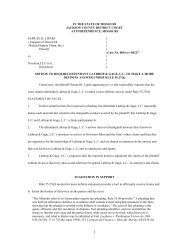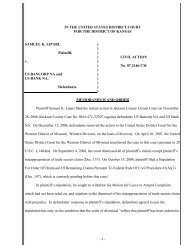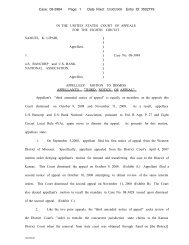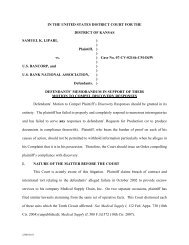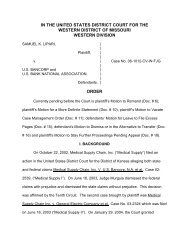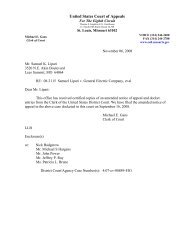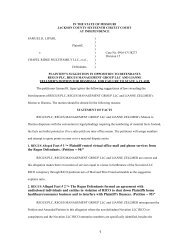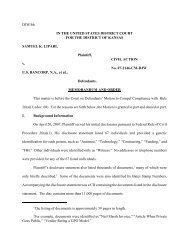Brief of Appellee General Electric 3115 - Medical Supply Chain
Brief of Appellee General Electric 3115 - Medical Supply Chain
Brief of Appellee General Electric 3115 - Medical Supply Chain
You also want an ePaper? Increase the reach of your titles
YUMPU automatically turns print PDFs into web optimized ePapers that Google loves.
Case: 08-<strong>3115</strong> Page: 1 Date Filed: 01/27/2009 Entry ID: 3511052<br />
APPEAL NO. 08-<strong>3115</strong><br />
IN THE UNITED STATES COURT OF APPEALS<br />
FOR THE EIGHTH CIRCUIT<br />
SAMUEL K. LIPARI<br />
Appellant<br />
v.<br />
GENERAL ELECTRIC CO., ET AL.,<br />
<strong>Appellee</strong>s<br />
AN APPEAL FROM THE UNITED STATES DISTRICT COURT<br />
FOR THE WESTERN DISTRICT OF MISSOURI<br />
REPLY BRIEF OF APPELLEES GENERAL ELECTRIC COMPANY,<br />
GENERAL ELECTRIC CAPITAL BUSINESS ASSET FUNDING<br />
CORPORATION, GE TRANSPORTATION SYSTEMS GLOBAL<br />
SIGNALING, LLC, JEFFREY IMMELT, HEARTLAND FINANCIAL<br />
GROUP, INC., CHRISTOPHER MCDANIEL AND STUART<br />
FOSTER<br />
John K. Power MO 35312<br />
Michael S. Hargens MO 51077<br />
HUSCH BLACKWELL SANDERS LLP<br />
1200 Main Street, Suite 2300<br />
Kansas City, MO 64105<br />
Telephone: 816-421-4800<br />
Facsimile: 816-421-0596
Case: 08-<strong>3115</strong> Page: 2 Date Filed: 01/27/2009 Entry ID: 3511052<br />
CORPORATE DISCLOSURE STATEMENTS<br />
Defendants <strong>General</strong> <strong>Electric</strong> Company, <strong>General</strong> <strong>Electric</strong> Capital<br />
Business Asset Funding Corporation and GE Transportation Systems Global<br />
Signaling, L.L.C., pursuant to Rule 26.1A, Eighth Circuit Rules <strong>of</strong> Appellate<br />
Procedure, state: <strong>General</strong> <strong>Electric</strong> Company ("GE") does not have any<br />
corporate parents, and no publicly traded company owns 10% or more <strong>of</strong> the<br />
stock <strong>of</strong> GE. <strong>General</strong> <strong>Electric</strong> Capital Business Asset Funding Corporation<br />
("GE Capital") and GE Transportation Systems Global Signaling L.L.C.<br />
("GETS") are subsidiaries <strong>of</strong> GE and no publicly traded company other than<br />
GE owns 10% or more <strong>of</strong> the stock or other ownership interest in either GE<br />
Capital or GETS.<br />
The defendant Heartland Financial Group, Inc., pursuant to Rule<br />
26.1A, Eighth Circuit Rules <strong>of</strong> Appellate Procedure, states that it is wholly<br />
owned by Heartland Holding Company, Inc. No publicly held company<br />
owns more than ten percent (10%) or more <strong>of</strong> the stock <strong>of</strong> Heartland<br />
Financial Group, Inc.<br />
i
Case: 08-<strong>3115</strong> Page: 3 Date Filed: 01/27/2009 Entry ID: 3511052<br />
TABLE OF CONTENTS<br />
TABLE OF AUTHORITIES iv<br />
JURISDICTIONAL STATEMENT 1<br />
ORAL ARGUMENT STATEMENT 2<br />
STATEMENT OF ISSUES PRESENTED FOR REVIEW 3<br />
STATEMENT OF THE CASE 5<br />
STATEMENT OF FACTS 7<br />
SUMMARY OF ARGUMENT 21<br />
ARGUMENT 23<br />
I. THE DISTRICT COURT DID NOT ERR IN GRANTING<br />
DEFENDANTS' MOTIONS TO DISMISS PLAINTIFF'S<br />
COMPLAINT 23<br />
A. Standard <strong>of</strong> Review. 23<br />
B. The District Court Correctly Determined That Plaintiff Lacked<br />
Standing To Assert A Claim Under the RICO Statute. 23<br />
C. In Addition to His Lack <strong>of</strong> St anding, Plaintiff Also Failed to<br />
Properly Plead the Requisite Elements <strong>of</strong> a Claim Brought Under<br />
RICO. 28<br />
1. Plaintiff's Insufficient "Enterprise" Allegations. 29<br />
2. Plaintiff's Insufficient "Pattern" Allegations. 30<br />
3. Plaintiff's Insufficient "Racketeering Activity" Allegations. 31<br />
a. Alleged Predicate Acts Related to Extortion. 32<br />
b. Alleged Predicate Acts Related to Fraud. 35<br />
II. THE DISTRICT COURT DID NOT ABUSE ITS DISCRETION<br />
WHEN IT DENIED PLAINTIFF'S MOTION TO AMEND HIS<br />
PLEADING. 38<br />
ii
Case: 08-<strong>3115</strong> Page: 4 Date Filed: 01/27/2009 Entry ID: 3511052<br />
III. THE DISTRICT COURT DID NOT ABUSE ITS DISCRETION<br />
WHEN IT DENIED PLAINTIFF' S"MOTION" TO RECUSE CHIEF<br />
JUDGE GAITAN. 43<br />
CONCLUSION 50<br />
CERTIFICATE OF SERVICE 51<br />
CERTIFICATE OF COMPLIANCE 52<br />
iii
Case: 08-<strong>3115</strong> Page: 5 Date Filed: 01/27/2009 Entry ID: 3511052<br />
Cases<br />
TABLE OF AUTHORITIES<br />
Allen v. Berenson Parimutuel <strong>of</strong> N.Y., 1998 WL 80168, at *3<br />
(S.D. N.Y., Feb. 25, 1998) 26<br />
Atlas Pile Driving Co. v. DiCon Fin. Co., 886 F.2d 986 (8th Cir. 1989) 29<br />
Bankers Trust Co. v. Rhodes, 859 F.2d 1096 (2 nd Cir. 1988) 25<br />
Bell Atlantic Corp. v. Twombly, 550 U.S. 544 (2007) 23<br />
Bennett v. Berg, 685 F.2d 1053 (8ffi Cir. 1982) 35<br />
Bridge v. Phoenix Bond & Indemnity Co.,<br />
128 S.Ct. 2131 (2008) 37, 39, 40, 42<br />
Briehl v. <strong>General</strong> Motors Corp., 172 F.3d 623 (8 ffi Cir. 1999) 41<br />
Butts v. Cont'1 Cas. Co., 357 F.3d 835, 837 n. 2 (8th Cir. 2004) 23<br />
First Nationwide Bank v. Gelt Funding Corp., 27 F.3d 763<br />
(2nd Cir. 1994) 26<br />
Fletcher v. Conoco Pipe Line Co., 323 F.3d 661 (8 ffi Cir. 2003) 43<br />
Green v. Ameritrade, 279 F.3d 590 (8th Cir. 2002) 23<br />
H. J., Inc. v. Northwestern Bell Co., 492 U.S. 229 (1989) 30, 31<br />
Hagerman v. Yukon Energy Corp., 839 F.2d 407 (8 ffi Cir. 1988) 40<br />
Hamm v Rhone-Poulenc Rorer Pharms., Inc., 187 F.3d 941<br />
(8ffi Cir. 1999) 24<br />
Handeen v. Lemaire, 112 F.3d 1339 (8 ffi Cir. 1997) 29<br />
Hartford Accident and Indemnity Co. v. Shaw, 273 F.2d 133<br />
(8ffi Cir. 1959) 39<br />
Holmes v. Securities Investor Protection Corp., 503 U.S. 258 (1992) 27<br />
Hooker v. Story, 159 F.3d 1139 (8 ffi Cir. 1998) 43<br />
iv
Case: 08-<strong>3115</strong> Page: 6 Date Filed: 01/27/2009 Entry ID: 3511052<br />
Imagineering, Inc. v. Kiewit Pacific Co., 976 F.2d 1303<br />
(9th Cir. 1992) 24<br />
In re Apex Oil Co., 981 F.2d 302 (8 ffi Cir. 1992) 44<br />
In re <strong>General</strong> Motors Corp. Anti-Lock Brake Products Liability Litigation,<br />
174 FRD 444 (E.D. Mo. 1997) 41, 43<br />
In re Kansas Public Employees Retirement Sys. (KPERS),<br />
85 F.3d 1353 4, 43, 44, 45, 46, 47, 48<br />
In re Landrith, 124 P.3d 467 (Kan. 2005) 18<br />
Innovative Home Health Care, Inc. v. P.T.-O.T. Assoc. <strong>of</strong> the Black Hills,<br />
141 F.3d 1284 (8 ffi Cir. 1998) 3, 40, 41<br />
Johnson v. Enron Corp., 906 F.2d 1234 (8th Cir. 1990) 23<br />
Lunde v. Helms, 29 F.3d 367 (8 ffi Cir. 1994) 46<br />
Miller v. Baker Implement Co., 439 F.3d 407 (8 ffi Cir. 2006) 3, 41<br />
Owen v. <strong>General</strong> Motors Corp., 533 F.3d 913 (8 ffi Cir. 2008) 35<br />
Perkins v. U.S. West Communications, 138 F.3d 336 (8 ffi Cir. 1998) 40<br />
Peters v. <strong>General</strong> Service Bureau, Inc., 277 F.3d 1051 (8 ffi Cir. 2002) 41<br />
Phipps v. Guaranty National Bank <strong>of</strong> Tallahassee, 417 F.3d 1006<br />
(8th Cir. 2005) 23<br />
Pope v. Federal Express Corp., 974 F.2d 982 (8 ffi Cir. 1992) 46<br />
Rabushka v. Crane Co., 122 F.3d 559 (8 ffi Cir. 1997) 4, 44, 45, 46<br />
Scenic Holding LLC v. New Board <strong>of</strong> Trustees <strong>of</strong> Tabernacle Missionary<br />
Baptist Church, Inc., 506 F.3d 656 (8 ffi Cir. 2007) 47<br />
Scheidler v. National Organization for Women, Inc.,<br />
537 U.S. 393 (2003) 3, 33, 34<br />
Sedima, S.P.R.L. v. Imrex Co., 473 U.S. 479,105 S.Ct. 3275,<br />
87 L.Ed.2d 346 (1985) 24, 29
Case: 08-<strong>3115</strong> Page: 7 Date Filed: 01/27/2009 Entry ID: 3511052<br />
Sheperd v. American Honda Motor Co., 822 F. Supp. 625<br />
(N.D. Cal. 1993) 24<br />
S<strong>of</strong>onia v. Principal Life Ins. Co., 465 F.3d 873 (8th Cir. 2006) 23<br />
Tri-State Financial, LLC v. Lovald, 525 F.3d 649 (8 ffi Cir. 2008) 44<br />
Trs. <strong>of</strong> Plumbers and Pipefitters Nat'l Pension Fund v. Transworld Mech.<br />
Inc., 886 F.Supp. 1134 (S.D. N.Y. 1995) 24<br />
TV Communications Network, Inc. v. ESPN, Inc., 767 F. Supp. 1077<br />
(D. Colo. 1991)<br />
United States v. Nardello, 393 U.S. 286, 290, 89 S.Ct. 534,<br />
21 L.Ed.2d 487 (1969)<br />
44<br />
34<br />
United States v. Poruhay, 533 F.3d 704 (8 ffi Cir. 2008) 39<br />
United States v. Vadner, 160 F.3d 263 (5 ffi Cir. 1998) 44, 46<br />
Wisdom v. First Midwest Bank <strong>of</strong> Poplar Bluff, 167 F.3d 402<br />
(8ffi Cir. 1999)<br />
World Wrestling Entertainment, Inc. v. Jakks Pacific, Inc.,<br />
530 F. Supp.2d 486 (S.D. N.Y. 2007) 3, 25, 26,<br />
29<br />
27, 28<br />
Statutes<br />
18 U.S.C. § 1951 (b)(2) 33<br />
18 U.S.C. § 1962 28<br />
Racketeering Influenced Corrupt Organizations Act 24<br />
Rules<br />
Fed. R. Civ. P. 12(b)(6) 23<br />
Fed. R. Civ. P. 59(e) 41<br />
Fed. R. Civ. P. 9(b) 36<br />
vi
Case: 08-<strong>3115</strong> Page: 8 Date Filed: 01/27/2009 Entry ID: 3511052<br />
JURISDICTIONAL STATEMENT<br />
This Court's jurisdiction over the Plaintiff's appeal is based on 28<br />
U.S.C. § 1291.<br />
1
Case: 08-<strong>3115</strong> Page: 9 Date Filed: 01/27/2009 Entry ID: 3511052<br />
ORAL ARGUMENT STATEMENT<br />
<strong>Appellee</strong>s <strong>General</strong> <strong>Electric</strong> Company, <strong>General</strong> <strong>Electric</strong> Capital<br />
Business Asset Funding Corporation, GE Transportation Systems Global<br />
Signaling, LLC, Jeffrey Immelt, Heartland Financial Group, Inc.,<br />
Christopher McDaniel and Stuart Foster (collectively, "Defendants"),<br />
pursuant to FRAP 34(a)(1), state that they do not believe that oral argument<br />
would aid the Court's determination <strong>of</strong> this appeal. This appeal involves the<br />
propriety <strong>of</strong> several rulings made by the District Court on certain dispositive<br />
and non-dispositive motions. The District Court's rulings on these motions<br />
were based solely upon the briefing, and thus, the Defendants believe that<br />
this Court's determination <strong>of</strong> the appeal can be based solely upon the<br />
appellate briefing and the record from the District Court. Accordingly,<br />
Defendants disagree with Appellant Samuel K. Lipari's (hereinafter<br />
"Plaintiff ') assertion that oral argument will aid the Court in addressing this<br />
appeal.<br />
2
Case: 08-<strong>3115</strong> Page: 10 Date Filed: 01/27/2009 Entry ID: 3511052<br />
STATEMENT OF ISSUES PRESENTED FOR REVIEW<br />
I. Whether the District Court erred in dismissing the Plaintiff's<br />
Amended Complaint for failure to assert a cognizable injury under<br />
RICO, 18 U.S.C. § 1961 et seq., or, in the alternative, whether<br />
Plaintiff also failed to adequately plead other necessary elements<br />
<strong>of</strong> a RICO claim against the Defendants.<br />
World Wrestling Entertainment, Inc. v. Jakks Pacific, Inc., 530 F.<br />
Supp.2d 486 (S.D. N.Y. 2007).<br />
Scheidler v. National Organization for Women, Inc., 537 U.S. 393<br />
(2003).<br />
II.<br />
Whether the District Court abused its discretion in denying<br />
Plaintiff's motion for leave to file a second amended Complaint,<br />
even though the proposed amended pleading would have only<br />
added new parties and would not have cured any <strong>of</strong> the<br />
deficiencies existing in his current pleading.<br />
Miller v. Baker Implement Co., 439 F.3d 407 (8 ffi Cir. 2006).<br />
Innovative Home Health Care, Inc. v. P.T.-O.T. Assoc. <strong>of</strong> the<br />
Black Hills, 141 F.3d 1284 (8 ffi Cir. 1998).<br />
III.<br />
Whether the District Court abused its discretion in denying<br />
Plaintiff's motion for recusal which was asserted after the District<br />
3
Case: 08-<strong>3115</strong> Page: 11 Date Filed: 01/27/2009 Entry ID: 3511052<br />
Court's entry <strong>of</strong> Judgment and which did not present any facts<br />
which would support recusal.<br />
In re Kansas Public Employees Retirement Sys., 85 F.3d 1353 (8ffi<br />
Cir. 1996).<br />
Rabushka v. Crane Co., 122 F.3d 559 (8 ffi Cir. 1997), cert. denied,<br />
523 U.S. 1040 (1998).<br />
4
Case: 08-<strong>3115</strong> Page: 12 Date Filed: 01/27/2009 Entry ID: 3511052<br />
STATEMENT OF THE CASE<br />
This appeal arises from the latest dismissal <strong>of</strong> a lawsuit brought by<br />
Plaintiff (or his company <strong>Medical</strong> <strong>Supply</strong> <strong>Chain</strong>). As is explained in more<br />
detail in the Statement <strong>of</strong> Facts, Plaintiff is a serial litigator who has brought<br />
numerous lawsuits in both state and federal courts in Missouri and Kansas<br />
which all allege that his start-up medical supply company has suffered<br />
billions in damages due to a vast, nebulous and ever-growing conspiracy<br />
among disparate persons and entities (both governmental and corporate) to<br />
keep him out <strong>of</strong> the medical supply business. Plaintiff's federal claims in<br />
each <strong>of</strong> these cases, which could generously be desc ribed as both meritless<br />
and non-sensical, have never survived a motion to dismiss. The current case<br />
is no exception.<br />
Apparently undaunted by his unsuccessful assertion <strong>of</strong> federal<br />
antitrust claims against the Defendants in other lawsuits, Plaintiff attempted<br />
to bring RICO claims in the present case. However, just as in the previous<br />
cases, Plaintiff's pleadings were patently deficient and the Defendants filed<br />
motions to dismiss based upon these deficiencies. On July 30, 2008, the<br />
District Court granted all <strong>of</strong> the motions to dismiss filed by Defendants. See<br />
5
Case: 08-<strong>3115</strong> Page: 13 Date Filed: 01/27/2009 Entry ID: 3511052<br />
Doc. 59. 1 Specifically, the District Court held that Plaintiff failed to assert a<br />
cognizable RICO injury because the "injury" alleged by Plaintiff was<br />
"indefinite and unprovable." Id. at p. 8. Within the same Order, the District<br />
Court denied Plaintiff's pending motion to file a second amended<br />
Complaint. Id. Plaintiff's proposed amended pleading, which he first<br />
sought to file after the Defendants' motions to dismiss were fully briefed,<br />
did not attempt to cure any <strong>of</strong> the deficiencies <strong>of</strong> his prior Complaint.<br />
Unable to survive the Defendants' motions to dismiss, Plaintiff then<br />
made one final, desperate attempt to keep his lawsuit alive — he accused the<br />
District Court <strong>of</strong> prejudice and bias and moved for recusal <strong>of</strong> the District<br />
Court Judge. Not surprisingly, this untimely and frivolous motion was<br />
denied. Plaintiff now appeals from the District Court's rulings: (1) granting<br />
the Defendants' motions to dismiss; (2) denying his motion to file a second<br />
amended Complaint; and (3) denying his motion for recusal. As will be<br />
explained herein, Plaintiff's appellate arguments are just as deficient as his<br />
arguments in the District Court.<br />
1 Any reference to a pleading or order filed in the District Cou rt will<br />
be denominated by the number assigned to it by the District Court (i.e.,<br />
"Doc. [number").<br />
6
Case: 08-<strong>3115</strong> Page: 14 Date Filed: 01/27/2009 Entry ID: 3511052<br />
STATEMENT OF FACTS2<br />
GE I<br />
1. On June 18, 2003, <strong>Medical</strong> <strong>Supply</strong> <strong>Chain</strong> 3 ("MSC") filed a<br />
lawsuit in the U.S. District Court for the District <strong>of</strong> Kansas against the GE<br />
Defendants, Defendant Immelt and others. See <strong>Medical</strong> <strong>Supply</strong> <strong>Chain</strong>, Inc.<br />
v. <strong>General</strong> <strong>Electric</strong> Company, et al., Civil Action No. 03-2324-CM ("GE I").<br />
In that action, MSC alleged that the GE Defendants and Defendant Immelt<br />
prevented MSC's entry into the health care supplier/distribution market by<br />
refusing to sublease a building and provide financing to MSC. See Def.<br />
Appx. #1.4 More specifically, MSC alleged that the GE Defendants and<br />
Defendant Immelt violated federal antitrust laws under the Sherman Act and<br />
2 Defendants note that Plaintiff's "Statement <strong>of</strong> Facts" contains<br />
numerous misstatements, arguments and legal conclusions that have nothing<br />
to do with the issues raised in this appeal. Inasmuch as nearly all <strong>of</strong><br />
Plaintiff's "Facts" are not relevant to the appellate arguments, Defend ants<br />
have not gone through the fruitless exercise <strong>of</strong> pointing out every erroneous<br />
statement included in Plaintiff's "Statement <strong>of</strong> Facts." However, by doing<br />
so, Defendants are not conceding that any <strong>of</strong> the "Facts" listed by Plaintiff<br />
are either accurate or relevant.<br />
3 <strong>Medical</strong> <strong>Supply</strong> <strong>Chain</strong>, Inc. is the dissolved corporation <strong>of</strong> which<br />
Mr. Lipari was the chief executive <strong>of</strong>ficer. Lipari purported to bring the<br />
current lawsuit as "the sole assignee <strong>of</strong> the dissolved corporation <strong>Medical</strong><br />
<strong>Supply</strong> <strong>Chain</strong>, Inc." See Doc. 6, p. 1.<br />
4 "Def. Appx." refers to the <strong>Appellee</strong>s' Separate Appendix filed with<br />
this brief.<br />
7
Case: 08-<strong>3115</strong> Page: 15 Date Filed: 01/27/2009 Entry ID: 3511052<br />
the Robinson-Patman Act. Id. MSC also asse rted state common law claims<br />
against the defendants, including breach <strong>of</strong> contract. Id.<br />
2. On January 29, 2004, the district court dismissed all <strong>of</strong> MSC's<br />
antitrust claims with prejudice, and declined to retain jurisdiction over the<br />
state law claims See <strong>Medical</strong> <strong>Supply</strong> <strong>Chain</strong>, Inc. v. <strong>General</strong> Elect ric<br />
Company, et al., 2004 WL 956100 (D. Kan. Jan. 29, 2004); Def. Appx. #2.<br />
Additionally, the district court determined that it was "unwilling at this<br />
^ 'un cture to conclude that Plaintiff's Amended Complaint was so meritless or<br />
otherwise frivolous that sanctions are warranted." Id. at *5 (emphasis<br />
added). The court ultimately denied the motion for Rule 11 sanctions which<br />
was filed in conjunction with the defendants' motion to dismiss. Id.<br />
3. MSC appealed the district Court's dismissal <strong>of</strong> its antitrust<br />
claims to the U.S. Court <strong>of</strong> Appeals for the Tenth Circuit. Simultaneously,<br />
the defendants cross-appealed the district court's denial <strong>of</strong> their motion for<br />
sanctions. On July 26, 2005, the Tenth Circuit affirmed the district court's<br />
dismissal <strong>of</strong> Plaintiff's antitrust claims See <strong>Medical</strong> <strong>Supply</strong> <strong>Chain</strong>, Inc. v.<br />
<strong>General</strong> <strong>Electric</strong> Company, et al., 144 Fed.Appx. 708 (10 ffi Cir. 2005); Def.<br />
Appx. #3. Further, the Tenth Circuit held that the district court abused its<br />
discretion in failing to sanction Plaintiff for asserting claims against<br />
8
Case: 08-<strong>3115</strong> Page: 16 Date Filed: 01/27/2009 Entry ID: 3511052<br />
Defendant Immelt in his individual capacity. Id. Specifically, the Court<br />
noted that:<br />
It is clear that at least MSC's claims against Jeffrey Immelt in<br />
his individual capacity were frivolous in that no allegation was<br />
made that Immelt had any personal connection to MSC's<br />
alleged injury or even that he knew MSC existed. Therefore, it<br />
was abuse <strong>of</strong> discretion not to find that portion <strong>of</strong> the Amended<br />
Complaint frivolous.<br />
Id. at 716. The Tenth Circuit remanded the matter to the dist rict court for a<br />
determination <strong>of</strong> the proper sanctions to impose against MSC for filing suit<br />
against Jeffrey Immelt in his individual capacity. Id.<br />
GE II (Current Lawsuit)<br />
4. On March 22, 2006, Plaintiff, purpo rtedly as the "Statutory<br />
Trustee <strong>of</strong> Dissolved <strong>Medical</strong> <strong>Supply</strong> <strong>Chain</strong>, Inc.," filed a lawsuit ("GE II")<br />
in the Circuit Court <strong>of</strong> Jackson County, Missouri against the GE Defendants,<br />
Defendant Foster, Defendant Heartland Financial and Carpet n' More. See<br />
Doc. 1, Ex. A. This lawsuit asserted the same breach <strong>of</strong> contract claims that<br />
were asserted by MSC in the GE I lawsuit. Id. Just as in the GE I lawsuit,<br />
Plaintiff sought monetary damages in the amount <strong>of</strong> pr<strong>of</strong>its "that it would<br />
have made for the next four years <strong>of</strong> operations had it been allowed to enter<br />
the market," as well as the equity it would have gained from the purchase <strong>of</strong><br />
the building, and the cash payment it would have received from GE for the<br />
buy-out <strong>of</strong> its lease. Id. However, unlike the GE I lawsuit, this time<br />
9
Case: 08-<strong>3115</strong> Page: 17 Date Filed: 01/27/2009 Entry ID: 3511052<br />
Plaintiff sought a specific monetary amount from the GE Defend ants --<br />
$450,000,000. Id.<br />
5. Although Plaintiff named Carpet n' More and Defendant Foster<br />
as defendants in his original Petition, Plaintiff never obtained service on<br />
them. See Doc. 1, Ex. B. In addition, although Defendant Heartland<br />
Financial was initially named as a defendant in this action, on May 4, 2006,<br />
the Circuit Court dismissed Plaintiff's Petition against Defendant Heartland<br />
Financial for failure to state a claim upon which relief could be granted. See<br />
Doc. 1, Ex. C. Thus, the only defendants who were served with Plaintiff's<br />
Petition, and who were not subsequently dismissed by the Circuit Court,<br />
were the GE Defendants.<br />
6. The Plaintiff's Petition was not removable when it was<br />
originally filed because it did not assert a federal question, nor was there<br />
complete diversity <strong>of</strong> the parties. See Doc. 1, Ex. A. However, on July 17,<br />
2006, the GE Defendants filed a notice <strong>of</strong> removal to the U.S. District Court<br />
for the Western District <strong>of</strong> Missouri on diversity grounds after it became<br />
clear that Plaintiff was not pursuing any claims against the one defendant<br />
(Carpet n'More) that defeated diversity. The District Court (Honorable<br />
Fernando J. Gaitan, Jr.) ultimately determined that it could not find that<br />
Plaintiff took any action which indicated his intention to discontinue the<br />
10
Case: 08-<strong>3115</strong> Page: 18 Date Filed: 01/27/2009 Entry ID: 3511052<br />
action against the non-diverse defendants, and the case was subsequently<br />
remanded back to the Circuit Court <strong>of</strong> Jackson County, Missouri. See Doc.<br />
1, Ex. D.<br />
7. On October 10, 2007, Plaintiff filed a "Motion for Leave to<br />
Amend Under RMSO 55.33." See Doc. 1, Ex. E. Plaintiff's motion sought<br />
leave from the Circuit Court to file an Amended Petition (a copy <strong>of</strong> which<br />
was attached to the motion) which would add new parties and new claims to<br />
this lawsuit, including a claim under the Racketeer Influenced and Corrupt<br />
Organizations Act (RICO), 18 U.S.C. § 1962, et seq. Id.<br />
8. The new defendants that Plaintiff sought to add through his<br />
proposed Amended Petition were Defendant Immelt, Defendant Foster<br />
(again), Defendant Heartland Financial (again), John Schmidt 5, Bradley J.<br />
Schlozman and Seyfarth Shaw LLP. Id.<br />
9. On October 23, 2007, the GE Defendants filed their<br />
Suggestions in Opposition to Plaintiff's Motion for Leave to Amend.6 See<br />
5 Christopher McDaniel was later substituted into the case as a<br />
defendant in place <strong>of</strong> John Schmidt.<br />
6 Plaintiff, in the Statement <strong>of</strong> the Case contained in his Appellant's<br />
<strong>Brief</strong> (p. 9), states that "[t]he <strong>General</strong> <strong>Electric</strong> defendants motioned to have<br />
the RICO claims dismissed on standing and for failure to state a claim but<br />
the state court overruled the motion to dismiss the RICO claims " This is a<br />
completely erroneous statement from Plaintiff. The GE Defendants never<br />
filed a motion to dismiss the RICO claims in the Circuit Court, and the<br />
Circuit Court never addressed any such motion. The only pleading that the<br />
11
Case: 08-<strong>3115</strong> Page: 19 Date Filed: 01/27/2009 Entry ID: 3511052<br />
Def. Appx. #4. The Circuit Court granted Plaintiff's Motion for Leave to<br />
Amend on October 31, 2007. See Doc. 1, Ex. G.<br />
10. Because Plaintiff indicated that he was pursuing a federal RICO<br />
claim the GE defendants removed the case to the U.S. District Court for the<br />
Western District <strong>of</strong> Missouri (Honorable Fernando J. Gaitan, Jr.) on<br />
November 9, 2007. See Doc. 1. Shortly thereafter, on December 7, 2007,<br />
Plaintiff filed his Amended Complaint which asserted claims under both<br />
RICO and the Hobbs Act. See Doc. 6.<br />
11. On January 18, 2008, the GE Defendants moved to Dismiss<br />
Plaintiff's Amended Complaint. See Docs. 11, 12.<br />
12. On February 12, 2008, Defendant Jeffrey Immelt moved to<br />
Dismiss Plaintiff's Amended Complaint. See Docs. 19, 20.<br />
13. On February 27, 2008, Defendants Heartland Financial,<br />
Christopher McDaniel and Stuart Foster moved to Dismiss Plaintiff's<br />
Amended Complaint. See Docs. 32, 33.<br />
14. On May 1, 2008, after the motions to dismiss were fully<br />
briefed, Plaintiff filed a motion requesting leave to amend his Complaint to<br />
add three new defendants to the lawsuit. See Doc. 49.<br />
GE Defendants filed in the Circuit Court with respect to Plaintiff's proposed<br />
RICO claims was their Suggestions in Opposition to Plaintiff's Motion for<br />
Leave to Amend.<br />
12
Case: 08-<strong>3115</strong> Page: 20 Date Filed: 01/27/2009 Entry ID: 3511052<br />
15. The Defendants subsequently filed a motion requesting that the<br />
District Court stay briefing on Plaintiff's motion to amend until the<br />
Defendants' motions to dismiss were decided by the Court, which would<br />
likely moot the motion to amend issue. See Doc. 51.<br />
16. On July 30, 2008, the District Court granted the motions to<br />
dismiss filed by all <strong>of</strong> the Defendants and dismissed the Plaintiff's RICO<br />
claims with prejudice. See Doc. 59. Within the same Order, the District<br />
Court denied Plaintiff's motion to amend his Complaint. Id.<br />
17. On August 4, 2008, Plaintiff filed a Motion to Alter or Amend<br />
the Judgment, in which he argued, for the first time, that the District Court<br />
should have recused himself from this case. See Doc. 61. The District<br />
Court, on October 31, 2008, denied Plaintiff's motion. See Doc. 76.<br />
18. On November 3, 2008, Plaintiff filed his Notice <strong>of</strong> Appeal to this<br />
Court. See Doc. 77.<br />
Other Lawsuits Involving Plaintiff'<br />
US Bancorp I<br />
7 In the section titled "Prior or Related Appeals and Litigation"<br />
contained in Plaintiff's Appellant's <strong>Brief</strong> (p. 1-6), Plaintiff sets forth<br />
numerous other cases which he believes are relevant to the current litigation.<br />
Although the Defendants certainly do not agree that all <strong>of</strong> these other cases<br />
are related to the present case, there are several cases referenced by Plaintiff<br />
which deserve special note because they are strikingly similar to the current<br />
lawsuit, and, as such, they will be addressed herein.<br />
13
Case: 08-<strong>3115</strong> Page: 21 Date Filed: 01/27/2009 Entry ID: 3511052<br />
19. Approximately seven months before filing GE I, on November<br />
12, 2002, MSC filed suit against US Bancorp (and a host <strong>of</strong> others) in the<br />
U.S. District Court for the District <strong>of</strong> Kansas. See <strong>Medical</strong> <strong>Supply</strong> <strong>Chain</strong>,<br />
Inc. v. US Bancorp, NA, et al., Civil Action No. 02-2539-CM ("US Bancorp<br />
I"). In that action, MSC alleged that it sought to establish a banking<br />
relationship with US Bancorp in March 2002, but that US Bancorp refused<br />
to establish the escrow accounts requested by MSC because <strong>of</strong> the "know<br />
your customer" requirements <strong>of</strong> the USA Patriot Act. See Def. Appx. #5.<br />
20. In addition to asserting various state law claims in its<br />
Complaint filed in the U.S. Bancorp I case, MSC alleged antitrust claims<br />
under the Sherman Act and Clayton Act, as well as violations <strong>of</strong> the Hobbs<br />
Act. Id. MSC alleged that the defendants refused to provide financing to<br />
MSC in order to prevent MSC from entering the healthcare supply market,<br />
thereby perpetuating their monopoly over the market Id. In addition, MSC<br />
alleged damages in excess <strong>of</strong> $943 million and sought declaratory relief. Id.<br />
21. On June 16, 2003, the United States District Court for the<br />
District <strong>of</strong> Kansas dismissed MSC's Complaint in US Bancorp I. See<br />
<strong>Medical</strong> <strong>Supply</strong> <strong>Chain</strong>, Inc. v. US Bancorp NA, et al., 2003 WL 21479192;<br />
Def. Appx. #6. The district court stated in the dismissal Order that some <strong>of</strong><br />
MSC's allegations were "completely divorced from rational thought." Id. at<br />
14
Case: 08-<strong>3115</strong> Page: 22 Date Filed: 01/27/2009 Entry ID: 3511052<br />
*8. The district court further admonished MSC's counsel "to take greater<br />
care in ensuring that the claims he brings on his client's behalf are supported<br />
by the law and the facts." Id. at *6.<br />
22. MSC appealed the district court's dismissal <strong>of</strong> US Bancorp I to<br />
the Tenth Circuit. Not only did the Tenth Circuit affirm the dismissal <strong>of</strong><br />
MSC's Complaint, it remanded the case to the district court to impose<br />
sanctions against Plaintiff and Plaintiff's counsel for the prosecution <strong>of</strong> a<br />
frivolous appeal. See <strong>Medical</strong> <strong>Supply</strong> <strong>Chain</strong>, Inc. v. US Bancorp NA, et al.,<br />
2004 WL 2504653 (10 ffi Cir. Nov. 8, 2004); Def. Appx. #7. Consequently,<br />
the district court ordered Plaintiff to pay Defendants' attorney's fees, which<br />
totaled $23,956.00. See <strong>Medical</strong> <strong>Supply</strong> <strong>Chain</strong>, Inc. v. US Bancorp NA, et<br />
L. 2005 WL 2122675 (D. Kan. May 13, 2005); Def. Appx. #8.<br />
US Bancorp II<br />
23. On November 28, 2006, Plaintiff filed another lawsuit against<br />
US Bancorp NA and U.S. Bank NA in the Circuit Court <strong>of</strong> Jackson County,<br />
Missouri ("US Bancorp II"), alleging the same state law claims that were<br />
dismissed without prejudice in U.S. Bancorp I, and seeking damages <strong>of</strong><br />
$450,000,000. See Def. Appx. #9. This lawsuit was subsequently removed<br />
to the Western District <strong>of</strong> Missouri, and then transferred to the U.S. District<br />
Court for the District <strong>of</strong> Kansas (Case No. 07-2146-CM). Id.<br />
15
Case: 08-<strong>3115</strong> Page: 23 Date Filed: 01/27/2009 Entry ID: 3511052<br />
24. On September 4, 2008, the district cou rt dismissed four <strong>of</strong> the<br />
five causes <strong>of</strong> action asserted by Plaintiff in US Bancorp II. See Def. Appx.<br />
#10. Plaintiff then moved to voluntarily dismiss with prejudice the lone<br />
remaining claim The district court granted Plaintiff's motion to voluntarily<br />
dismiss the remaining claim, but also ordered Plaintiff to pay Defendants<br />
$700 in attorney's fees and expenses which the magistrate judge had<br />
previously awarded to Defendants related to a motion to compel which they<br />
were forced to file against Plaintiff. See Def. Appx. #11.<br />
25. Notably, in the US Bancorp II case, Plaintiff filed an "Affidavit<br />
<strong>of</strong> Prejudice," which alleged that Judge Murguia and Magistrate Judge<br />
Waxse had demonstrated "manifest prejudice and bias against the plaintiff."<br />
See Def. Appx. #12.<br />
26. Plaintiff filed a notice <strong>of</strong> appeal <strong>of</strong> the district court's dismissal<br />
<strong>of</strong> his claims in US Bancorp II, and this matter is currently pending in the<br />
Tenth Circuit <strong>of</strong> the U.S. Court <strong>of</strong> Appeals.<br />
Ne<strong>of</strong>orma I<br />
27. On March 9, 2005, MSC filed a lawsuit in the U.S. District<br />
Court for the Western District <strong>of</strong> Missouri against Ne<strong>of</strong>orma, Inc., Novation,<br />
LLC, US Bancorp, and various other corporate entities and individuals. See<br />
<strong>Medical</strong> <strong>Supply</strong> <strong>Chain</strong>, Inc. v. Ne<strong>of</strong>orma, Inc., et al., No. 05-2010-CV-W-<br />
16
Case: 08-<strong>3115</strong> Page: 24 Date Filed: 01/27/2009 Entry ID: 3511052<br />
ODS; Def. Appx. #13. The case was subsequently transferred to the U.S.<br />
District Court for the District <strong>of</strong> Kansas. See <strong>Medical</strong> <strong>Supply</strong> <strong>Chain</strong>, Inc. v.<br />
Ne<strong>of</strong>orma, Inc., et al., No. 05-2299-CM ("Ne<strong>of</strong>orma I").<br />
28. Similar to its previous lawsuits, MSC was alleging that the<br />
defendants improperly prevented MSC from obtaining the necessary<br />
financing (from US Bancorp and GE Capital) and <strong>of</strong>fice space (from GE) to<br />
enter the hospital supply market. Id. Specifically, MSC alleged that the<br />
defendants conspired to restrain trade in the hospital supply market MSC<br />
asserted claims under the Sherman Act, Clayton Act, the Declaratory<br />
Judgment Act, RICO, the Hobbs Act and the USA PATRIOT Act, in<br />
addition to numerous common law claims Id. Although not named as<br />
defendants in that action, MSC specifically alleged that GE, GE Capital and<br />
GE Transportation (i.e., the GE Defendants in the present lawsuit) were coconspirators<br />
with the named defendants in the Ne<strong>of</strong>orma I case. Id. Plaintiff<br />
sought damages in excess <strong>of</strong> $3 billion. Id.<br />
29. On March 7, 2006, the district court dismissed all <strong>of</strong> MSC's<br />
federal claims against all <strong>of</strong> the defendants with prejudice, and declined to<br />
retain jurisdiction over the state law claims. <strong>Medical</strong> <strong>Supply</strong> <strong>Chain</strong>, Inc. v.<br />
Ne<strong>of</strong>orma, Inc., et al., 419 F.Supp.2d 1316, 1335-36 (D. Kan. 2006); Def.<br />
Appx. #14. In so ruling, the district court held, inter alia, that MSC's RICO<br />
17
Case: 08-<strong>3115</strong> Page: 25 Date Filed: 01/27/2009 Entry ID: 3511052<br />
and Hobbs Act claims failed to state claims for which relief may be granted.<br />
Id. at 1328-30. In addition, the district court determined that MSC's<br />
Complaint, as a whole, violated the pleading guidelines set forth in Federal<br />
Rule <strong>of</strong> Civil Procedure 8(a) and 8(e)(1). Id. at 1331. Specifically, the<br />
district court found that MSC's 115-page, 613-paragraph Complaint fell<br />
"miles from Rule 8's boundaries." Id.<br />
30. In addition to dismissing MSC's claims, the district court<br />
imposed sanctions on MSC's attorney, Bret Landrith, 8 as well as MSC's<br />
CEO and sole shareholder, Lipari. Id. at 1333-35. In setting forth the basis<br />
for its decision to sanction Lipari, the Court noted that Lipari "[took]<br />
responsibility for the decisions to knowingly bring the instant lawsuit after<br />
the result <strong>of</strong> plaintiff's previous attempts at litigation." Id. at 1334. The<br />
Court hoped that sanctioning Lipari, in addition to Landrith, would "serve[]<br />
to deter both from future frivolous filings." Id. at 1335. As sanctions for<br />
Plaintiff, the district court ultimately awarded Defendants $114,745.96 in<br />
attorney's fees and expenses. See Def. Appx. 15, 16.<br />
31. Plaintiff appealed the district court's dismissal <strong>of</strong> his claims.<br />
The Tenth Circuit Court <strong>of</strong> Appeals dismissed the appeal. See Def. Appx.<br />
8 By the time that this decision was rendered by the district cou rt, Mr.<br />
Landrith had already been disbarred by the Supreme Court <strong>of</strong> Kansas for,<br />
among other things, filing frivolous pleadings and motions. See In re<br />
Landrith, 124 P.3d 467 (Kan. 2005)<br />
18
Case: 08-<strong>3115</strong> Page: 26 Date Filed: 01/27/2009 Entry ID: 3511052<br />
#17. Plaintiff then filed with the district cou rt a "Rule 59(e) Motion to Alter<br />
or Amend the Judgment." The district court, in denying this motion, stated<br />
the following:<br />
This case has already been dismissed, but Mr. Lipari, who is<br />
not a plaintiff, persists in filing motions in this case. The court<br />
has warned him that if he continues to attempt to "resurrect"<br />
this case it could result in sanctions. Mr. Lipari has responded<br />
by filing repetitive motions in this case and by filing other cases<br />
in federal and state court that he contends are the "same case or<br />
controversy." Because Mr. Lipari has disregarded prior<br />
warnings and continues to attempt to act as plaintiff in this<br />
dismissed case, Mr. Lipari is prohibited from submitting<br />
any other filings in this case, 05-2299, unless he is<br />
represented by counsel in this case.<br />
See Def. Appx. #18 (emphasis in original).<br />
32. Plaintiff appealed the district court's denial <strong>of</strong> his "Rule 59(e)<br />
Motion" to the Tenth Circuit Court <strong>of</strong> Appeals, where the matter is currently<br />
pending.<br />
Ne<strong>of</strong>orma II<br />
33. On February 25, 2008, Plaintiff filed a lawsuit in the Circuit<br />
Court <strong>of</strong> Jackson County, Missouri ("Ne<strong>of</strong>orma II") against Ne<strong>of</strong>orma, Inc.,<br />
Novation, LLC, and numerous other corporate entities and individuals who<br />
were defendants in Ne<strong>of</strong>orma I. See Def. Appx. #19.<br />
34. In Ne<strong>of</strong>orma II, Plaintiff alleged violations <strong>of</strong> Missouri antitrust<br />
laws, in addition to tortious interference with business relations, fraud and<br />
19
Case: 08-<strong>3115</strong> Page: 27 Date Filed: 01/27/2009 Entry ID: 3511052<br />
prima facie tort. Id. Similar to its previous lawsuits, Plaintiff alleged that<br />
the defendants improperly prevented him from obtaining the necessary<br />
financing (from US Bancorp and GE Capital) and <strong>of</strong>fice space (from GE) to<br />
enter the hospital supply market. Id. In this lawsuit, Plaintiff sought<br />
damages in excess <strong>of</strong> $3.2 billion. Id.<br />
35. As <strong>of</strong> December 29, 2008, every defend ant who had been<br />
served with process in the Ne<strong>of</strong>orma II case had been dismissed with<br />
prejudice by the Circuit Court, pursuant to either a motion to dismiss or a<br />
motion for judgment on the pleadings. See Def. Appx. 20, 21.<br />
36. Plaintiff previously attempted to appeal a portion <strong>of</strong> these<br />
dismissals to the Missouri Court <strong>of</strong> Appeals, Western District, but his appeal<br />
was dismissed. See Def. Appx. #22. On January 9, 2009, Plaintiff filed a<br />
Second Notice <strong>of</strong> Appeal with the Missouri Court <strong>of</strong> Appeals, Western<br />
District, and this appeal is currently pending.<br />
20
Case: 08-<strong>3115</strong> Page: 28 Date Filed: 01/27/2009 Entry ID: 3511052<br />
SUMMARY OF ARGUMENT<br />
I. The District Court was correct in dismissing Plaintiff's Amended<br />
Complaint. Specifically, the Court correctly determined that Plaintiff lacked<br />
standing to assert a claim under RICO because Plaintiff's alleged injuries<br />
were indefinite and unprovable.<br />
In addition to Plaintiff's lack <strong>of</strong> standing to assert a RICO claim,<br />
Plaintiff's Amended Complaint should be dismissed because he failed to<br />
properly plead the requisite elements <strong>of</strong> a RICO cause <strong>of</strong> action.<br />
Specifically, Plaintiff failed to adequately plead the RICO elements <strong>of</strong><br />
"enterprise," "pattern," and "racketeering activity."<br />
II.<br />
The District Court did not abuse its discretion in denying Plaintiff's<br />
motion to amend his Complaint. Significantly, Plaintiff's proposed amended<br />
pleading only sought to add three new parties; it did not attempt to address<br />
any <strong>of</strong> the deficiencies which supported the dismissal <strong>of</strong> Plaintiff's Amended<br />
Complaint.<br />
III.<br />
The District Court did not abuse its discretion in denying Plaintiff's<br />
motion for recusal. Plaintiff's motion, filed after the District Court<br />
dismissed his Amended Complaint, was untimely. In addition, Plaintiff<br />
21
Case: 08-<strong>3115</strong> Page: 29 Date Filed: 01/27/2009 Entry ID: 3511052<br />
failed to demonstrate how the District Court Judge's former affiliation to a<br />
non-party in this case would cause the Judge to be biased and prejudiced<br />
against the Plaintiff.<br />
22
Case: 08-<strong>3115</strong> Page: 30 Date Filed: 01/27/2009 Entry ID: 3511052<br />
ARGUMENT<br />
I. THE DISTRICT COURT DID NOT ERR IN GRANTING<br />
DEFENDANTS' MOTIONS TO DISMISS PLAINTIFF'S<br />
COMPLAINT.<br />
A. Standard <strong>of</strong> Review.<br />
This Court reviews de novo an order granting a motion to dismiss<br />
under Fed. R. Civ. P. 12(b)(6). See S<strong>of</strong>onia v. Principal Life Ins. Co., 465<br />
F.3d 873, 876 (8th Cir. 2006); Phipps v. Guaranty National Bank <strong>of</strong><br />
Tallahassee, 417 F.3d 1006 (8th Cir. 2005); Green v. Ameritrade, 279 F.3d<br />
590 (8th Cir. 2002). While the Court must credit a complaint's well-pled<br />
factual allegations, it is not required to credit any legal conclusions or bald<br />
assertions. See Bell Atlantic Corp. v. Twombly, 550 U.S. 544 (2007).<br />
Under a de novo standard <strong>of</strong> review, the Court may affirm the district<br />
court's decision based on any ground appearing in the record that would<br />
support the decision, even if the district court did not rely on that ground in<br />
reaching its decision. See Johnson v Enron Corp., 906 F.2d 1234, 1238 (8th<br />
Cir. 1990) (concluding that an appellee could argue for affirmance based on<br />
a different legal standard than the one applied by the district court); Butts v.<br />
Cont'l Cas. Co., 357 F.3d 835, 837 n. 2 (8th Cir. 2004) (same).<br />
B. The District Court Correctly Determined That Plaintiff<br />
Lacked Standing To Assert A Claim Under the RICO<br />
Statute.<br />
23
Case: 08-<strong>3115</strong> Page: 31 Date Filed: 01/27/2009 Entry ID: 3511052<br />
The District Court correctly determined that Plaintiff lacked standing<br />
to assert a claim under the Racketeering Influenced Corrupt Organizations<br />
Act ("RICO") statute. As stated in Hamm v. Rhone-Poulenc Rorer Pharms.,<br />
Inc., 187 F.3d 941, 951 (8ffi Cir. 1999):<br />
[A RICO] plaintiff only has standing if, and can only recover<br />
to the extent that, he [or she] has been injured in his [or her]<br />
business or property by the conduct constituting the violation.<br />
Sedima, S.P.R.L. v. Imrex Co., 473 U.S. 479, 495-96, 105 S.Ct.<br />
3275, 87 L.Ed.2d 346 (1985) (Sedima). Thus, the two<br />
requirements for RICO standing are (1) an injury to "business<br />
or property" (2) caused "by reason <strong>of</strong>' a RICO violation.<br />
In addition, it is well established that a plaintiff in a RICO case c annot<br />
recover for speculative losses or where the amount <strong>of</strong> damages is<br />
unprovable. Trs. <strong>of</strong> Plumbers and Pipefitters Nat'l Pension Fund v.<br />
Transworld Mech. Inc., 886 F.Supp. 1134, 1146 (S.D. N.Y. 1995). In fact, a<br />
RICO plaintiff must allege and establish a concrete, financial loss to his<br />
business or property in order to have standing to assert a RICO claim See<br />
e.g., Imagineering, Inc. v. Kiewit Pacific Co., 976 F.2d 1303, 1310 (9th Cir.<br />
1992) (rejecting a RICO claim where "the facts alleged do not establish<br />
pro<strong>of</strong> <strong>of</strong> 'concrete financial loss,' let alone show that money was paid out as<br />
a result <strong>of</strong> [defendant's] alleged racketeering activity."); Sheperd v.<br />
American Honda Motor Co., 822 F. Supp. 625, 629 (N.D. Cal. 1993) (noting<br />
24
Case: 08-<strong>3115</strong> Page: 32 Date Filed: 01/27/2009 Entry ID: 3511052<br />
that "the requirement <strong>of</strong> a concrete financial loss proximately caused by the<br />
wrongful conduct <strong>of</strong> RICO defendants is not easily met").<br />
As the District Court in the present case correctly determined,<br />
Plaintiff lacked standing to assert a claim under RICO because Plaintiff's<br />
alleged injuries were "indefinite and unprovable." See Doc. 59, p. 8. In<br />
addition, Plaintiff lacked RICO standing because his alleged damages were<br />
not proximately caused by reason <strong>of</strong> a RICO violation.<br />
The case <strong>of</strong> World Wrestling Entertainment, Inc. v. Jakks Pacific,<br />
Inc., 530 F.Supp.2d 486 (S.D. N.Y. 2007) is instructive. In Jakks Pacific,<br />
the plaintiff (licensor) brought a RICO claim against defendants (licensees)<br />
alleging, inter alia, that the defendants defrauded plaintiff and deprived it<br />
"<strong>of</strong> the intangible right <strong>of</strong> honest services from [plaintiff's] intellectual<br />
property licensing agent and its management supervisor <strong>of</strong> that licensing<br />
agent, ... to obtain thereby valuable toy licensing rights and a lucrative<br />
videogame license at lower than competitive royalty rates." Id. at 495. In<br />
analyzing whether the plaintiff properly pled an injury redressable under<br />
RICO, the district court in Jakks Pacific noted the following with respect to<br />
RICO damages:<br />
The remedial purpose <strong>of</strong> RICO is to put the injured plaintiff in<br />
the same financial position it would have been in absent the<br />
misconduct. See Bankers Trust Co. v. Rhodes, 859 F.2d 1096,<br />
1106 (2nd Cir. 1988). If the damages cannot be ascertained,<br />
25
Case: 08-<strong>3115</strong> Page: 33 Date Filed: 01/27/2009 Entry ID: 3511052<br />
Id. at 521.<br />
then there is no lawful way to compensate the plaintiff. Thus,<br />
the courts regularly have held that a plaintiff who alleges<br />
injuries that are "indefinite and unprovable" does not have<br />
standing under, and cannot recover damages pursuant to, RICO.<br />
See First Nationwide Bank v. Gelt Funding Corp., 27 F.3d 763,<br />
768 (2nd Cir. 1994); Allen v. Berenson Parimutuel <strong>of</strong> N.Y ., 1998<br />
WL 80168, at *3 (S.D. N.Y., Feb. 25, 1998).<br />
In Jakks Pacific, the defendants argued that plaintiff's claims <strong>of</strong><br />
injury, which were premised upon lost business opportunities (and lost<br />
pr<strong>of</strong>its resulting therefrom) that it would have earned on its licenses but for<br />
the defendant's fraudulent scheme, were deficient under RICO because they<br />
were speculative and unquantifiable. Id. at 521-22. The district court agreed<br />
with the defendants, and held that, the great number <strong>of</strong> variables and factors<br />
that would affect the calculation <strong>of</strong> such damages rendered the claim too<br />
speculative to survive. 9 Id. at 521-24.<br />
9 To this point, the Court stated that:<br />
The problem with Plaintiff's claim <strong>of</strong> RICO injury is not that it<br />
cannot claim lost business opportunities as a result <strong>of</strong><br />
Defendants' alleged misconduct. Instead, the legal infirmity<br />
derives from the fact that there is no plausible set <strong>of</strong> facts,<br />
consistent with Plaintiff's allegations, that makes the alleged<br />
injury sufficiently concrete to state a RICO claim<br />
Jakks Pacific, 530 F.Supp.2d at 521.<br />
26
Case: 08-<strong>3115</strong> Page: 34 Date Filed: 01/27/2009 Entry ID: 3511052<br />
Plaintiff's damages claims in the present case are even more<br />
speculative and unprovable than those asserted in Jakks Pacific. Plaintiff's<br />
fanciful and conclusory allegation <strong>of</strong> $450 million in damages (which, after<br />
trebling, would total $1.35 billion) to his start-up business, which<br />
supposedly resulted from the alleged predicate acts purportedly committed<br />
by the Defendants, does not even begin to approach the requisite "concrete<br />
loss" requirement <strong>of</strong> RICO claims<br />
In addition to his failure to allege a cognizable RICO injury, Plaintiff<br />
also failed to satisfy the requirement that any claimed RICO injuries must be<br />
proximately caused by the defendant's conduct. See Holmes v. Securities<br />
Investor Protection Corp., 503 U.S. 258, 266-68 (1992) (rejected "but for"<br />
causation standard to establish standing under RICO, and construed RICO to<br />
require proximate causation between the injuries asserted and the conduct<br />
alleged). The District Court correctly noted that numerous factors, such as<br />
"poor marketing, lack <strong>of</strong> vendor contracts, inefficiencies, sub-par product<br />
<strong>of</strong>ferings, timing <strong>of</strong> entry into the marketplace and lack <strong>of</strong> experience in the<br />
industry" could have caused Plaintiff's company to struggle getting <strong>of</strong>f the<br />
ground. 10 See Doc. 59, p. 8. As a practical matter, it would be all but<br />
10 The lack <strong>of</strong> proximate cause is fu rther evidenced by the fact that the<br />
RICO damages alleged in this case (i.e., lost pr<strong>of</strong>its from allegedly being<br />
shut out <strong>of</strong> the market, revenue from the buy-out <strong>of</strong> the lease agreement,<br />
27
Case: 08-<strong>3115</strong> Page: 35 Date Filed: 01/27/2009 Entry ID: 3511052<br />
impossible to determine exactly what caused Plaintiff's company to fail to<br />
reach the success that Plaintiff (reasonably or unreasonably) envisioned for<br />
it. This inherent uncertainty as to damages and causation dooms Plaintiff's<br />
RICO claims, just as was the case in Jakks Pacific.<br />
There can be no doubt that Plaintiff's alleged damages, if any, in this<br />
case were purely speculative and unquantifiable. Prior case law has<br />
recognized that the "concrete loss" requirement <strong>of</strong> a valid RICO claim is not<br />
easily met, and it certainly was not met here. Inasmuch as Plaintiff failed to<br />
demonstrate that he suffered a quantifiable and cognizable injury under<br />
RICO, Plaintiff lacked standing to assert RICO claims against any <strong>of</strong> the<br />
Defendants. 11 Thus, Plaintiff's RICO claims asserted against the Defendants<br />
were properly dismissed by the District Court.<br />
C. In Addition to His Lack <strong>of</strong> Standing, Plaintiff Also Failed to<br />
Properly Plead the Requisite Elements <strong>of</strong> a Claim Brought<br />
Under RICO.<br />
etc ) mirror the damages sought by Plaintiff in several p rior (unsuccessful)<br />
lawsuits filed by the Plaintiff. See Statement <strong>of</strong> Facts. If these same<br />
damages were caused by the actions alleged by Plaintiff in those previous<br />
lawsuits, they could not have been proximately caused by the RICO<br />
predicate acts alleged in the present case.<br />
11 This deficiency undermined Plaintiff's substantive RICO claims<br />
under 18 U.S.C. § 1962 (c), as well as his RICO conspiracy claims under 18<br />
U.S.C. § 1962(d). See Jakks Pacific, 530 F.Supp.2d at 530 (stating that<br />
plaintiff's RICO conspiracy claim failed because, inter alia, plaintiff did not<br />
adequately allege a RICO injury).<br />
28
Case: 08-<strong>3115</strong> Page: 36 Date Filed: 01/27/2009 Entry ID: 3511052<br />
In order to recover under RICO, a plaintiff must allege "(1) conduct<br />
(2) <strong>of</strong> an enterprise (3) through a pattern (4) <strong>of</strong> racketeering activity."<br />
Wisdom v. First Midwest Bank <strong>of</strong> Poplar Bluff, 167 F.3d 402, 406 (8 ffi Cir.<br />
1999) (citing Sedima, S.P.R.L. v. Imrex Co., Inc., 473 U.S. 479, 496<br />
(1985)). Plaintiff failed to satisfy these mandatory pleading requirements,<br />
and, consequently, his RICO claims against the Defendants were properly<br />
dismissed.<br />
1. Plaintiff's Insufficient "Enterprise" Allegations.<br />
Plaintiff's RICO claims failed because he did not adequately allege<br />
the existence <strong>of</strong> a RICO "enterprise." In order to adequately plead a RICO<br />
enterprise, Plaintiff must allege facts establishing • (1) a common or shared<br />
purpose; (2) some continuity <strong>of</strong> structure and personnel; and (3) an<br />
ascertainable structure distinct from that inherent in a pattern <strong>of</strong><br />
racketeering. Handeen v. Lemaire, 112 F.3d 1339, 1351 (8 ffi Cir. 1997)<br />
(citing Atlas Pile Driving Co. v. DiCon Fin. Co., 886 F.2d 986, 995 (8th Cir.<br />
1989)). Plaintiff has failed to sufficiently allege any <strong>of</strong> these three elements<br />
<strong>of</strong> an enterprise. With respect to the first two elements, Plaintiff did not<br />
adequately plead a common or shared purpose among all <strong>of</strong> the Defendants,<br />
and he failed to establish any ascertainable structure to the alleged<br />
"enterprise" through his pleadings. With regard to the third element,<br />
29
Case: 08-<strong>3115</strong> Page: 37 Date Filed: 01/27/2009 Entry ID: 3511052<br />
Plaintiff failed to assert any claim that the "enterprise" exists separate from<br />
the racketeering activity alleged in his Amended Complaint. All <strong>of</strong> these<br />
pleading deficiencies support the dismissal <strong>of</strong> Plaintiff's RICO claims<br />
2. Plaintiff's Insufficient "Pattern" Allegations.<br />
In addition to the other deficiencies set forth above, Plaintiff's<br />
Amended Complaint also failed to allege the "pattern" element required for<br />
a viable RICO claim. The Supreme Court has held that "to prove a pattern<br />
<strong>of</strong> racketeering activity a plaintiff ... must show that the racketeering<br />
predicate acts are related and that they amount to or pose a threat <strong>of</strong><br />
continued criminal activity." H. J., Inc. v. No rthwestern Bell Co., 492 U.S.<br />
229, 239 (1989). "It is this factor <strong>of</strong> continuity plus relationship which<br />
combines to produce a pattern." Id. (citation omitted). Relatedness may be<br />
established if the acts have the "same or similar purposes, results,<br />
participants, victims, or methods <strong>of</strong> commission." Id. at 240. Continuity, in<br />
turn, requires either "a closed period <strong>of</strong> repeated conduct" or "past conduct<br />
that by its nature projects into the future with a threat <strong>of</strong> repetition." Id.<br />
Thus, a plaintiff in a RICO action must allege either an "open-ended" pattern<br />
<strong>of</strong> racketeering activity (i.e., past criminal conduct coupled with a threat <strong>of</strong><br />
future criminal conduct) or a "closed-ended" pattern <strong>of</strong> racketeering activity<br />
30
Case: 08-<strong>3115</strong> Page: 38 Date Filed: 01/27/2009 Entry ID: 3511052<br />
(i.e., past criminal conduct "extending over a substantial period <strong>of</strong> time").<br />
Id.<br />
Plaintiff's Amended Complaint fails to establish either an open-ended<br />
or closed-ended pattern. Not only were the individual predicate acts pled by<br />
Plaintiff unrelated, there is no allegation connecting the Defendants to each<br />
(or any) <strong>of</strong> the alleged predicate acts. Rather than properly pleading the<br />
"pattern" element necessary to state a cause <strong>of</strong> action under RICO,<br />
Plaintiff's Amended Complaint was nothing more than an amalgamation <strong>of</strong><br />
fanciful and unrelated alleged "acts" <strong>of</strong> the various Defendants. This<br />
constitutes yet another reason why dismissal <strong>of</strong> the Plaintiff's Amended<br />
Complaint was warranted.<br />
3. Plaintiff's Insufficient "Racketeering Activity"<br />
Allegations.<br />
Plaintiff attempted to establish "racketeering activity" by alleging<br />
predicate acts that were deficient on their face. Although Plaintiff asserted<br />
fourteen separate predicate acts in his Amended Complaint, each <strong>of</strong> the<br />
alleged acts can be placed into one <strong>of</strong> two categories: extortion or fraud.12<br />
12<br />
Plaintiff attached the following labels to the fourteen predicate acts<br />
(or "Racketeering Acts") alleged in his Amended Complaint:<br />
1. Attempted Extortion to Prevent the Petitioner from Bringing his<br />
Antitrust Claim;<br />
31
Case: 08-<strong>3115</strong> Page: 39 Date Filed: 01/27/2009 Entry ID: 3511052<br />
Plaintiff attempted to allege eleven separate acts <strong>of</strong> exto rtion (or attempted<br />
extortion), and three separate acts <strong>of</strong> fraud. However, the allegations<br />
supporting each <strong>of</strong> these acts were deficient, and, thus, Plaintiff's RICO<br />
claims necessarily failed.<br />
a. Alleged Predicate Acts Related to Extortion.<br />
Plaintiff's extortion-related predicate acts were delineated in his<br />
Amended Complaint as "Racketeering Acts" 1, 2, 3, 4, 5, 6, 7, 8, 9, 12 and<br />
2. Attempted Extortion <strong>of</strong> Petitioner's Kansas Legal Representation ;<br />
3. Extortion <strong>of</strong> Petitioner's Legal Representation in the Western<br />
District <strong>of</strong> Missouri;<br />
4. Extortion Against Independence Examiner Newspaper;<br />
5. Attempted Extortion <strong>of</strong> Counsel Over Petitioner's Contract<br />
Claims;<br />
6. Extortion over Petitioner's Replacement Counsel David Sperry;<br />
7. Extortion over Petitioner's Replacement Counsel James C.<br />
Wirken;<br />
8. Attempted Extortion over Judy Jewsome for Helping Petitioner's<br />
Witness David Price;<br />
9. Attempted Extortion over Associate Donna Huffman a Potential<br />
Replacement Counsel;<br />
10.GE, GE Transportation and GE Capital Defendants' Fraud in<br />
Removal to Federal Court;<br />
11.June 5ffi Fraudulent Testimony <strong>of</strong> Defendant Bradley J. Schlozman;<br />
12.Attempted Extortion Over Petitioner's Witness, Bret D. Landrith;<br />
13.Attempted Extortion Over a Potential Replacement Counsel; and<br />
14.Fraudulent Misrepresentations on Form 10-K's by Defendant<br />
Jeffrey R. Immelt.<br />
See Doc. 6 (emphasis added).<br />
32
Case: 08-<strong>3115</strong> Page: 40 Date Filed: 01/27/2009 Entry ID: 3511052<br />
13. See Doc. 6. None <strong>of</strong> these alleged acts, however, constitute extortion or<br />
attempted extortion.<br />
The acts <strong>of</strong> extortion alleged by Plaintiff do not constitute extortion as<br />
pled. Under the Hobbs Act, extortion is defined as the "obtaining <strong>of</strong><br />
property from another, with his consent, induced by wrongful use <strong>of</strong> actual<br />
or threatened force, violence or fear, or under color <strong>of</strong> <strong>of</strong>ficial right." 18<br />
U.S.C. § 1951 (b)(2). Fatally, not one <strong>of</strong> the extortion-related predicate acts<br />
asserted by the Plaintiff properly alleged that the Defendants obtained<br />
property from the Plaintiff.<br />
The United States Supreme Court has directly addressed the<br />
"obtaining <strong>of</strong> property" requirement that must be established in any case<br />
where extortion is pled under either the Hobbs Act or common law. In<br />
Scheidler v. National Organization for Women, Inc., 537 U.S. 393 (2003),<br />
the plaintiffs (a women's rights organization and various abortion clinics)<br />
claimed that the defendants (individual and corporate organizers <strong>of</strong> an<br />
antiabortion protest network) violated RICO by engaging in a nationwide<br />
conspiracy to shut down clinics through a pattern <strong>of</strong> racketeering activity<br />
that included acts <strong>of</strong> extortion in violation <strong>of</strong> the Hobbs Act. The Supreme<br />
Court's analysis <strong>of</strong> the plaintiffs' claims focused upon the "obtaining <strong>of</strong><br />
33
Case: 08-<strong>3115</strong> Page: 41 Date Filed: 01/27/2009 Entry ID: 3511052<br />
property" language set forth in the Hobbs Act. Specifically, the Supreme<br />
Court noted that:<br />
There is no dispute in these cases that petitioners interfered<br />
with, disrupted, and in some instances completely dep rived<br />
respondents <strong>of</strong> their ability to exercise their prope rty rights. ...<br />
But even when their acts <strong>of</strong> interference and disruption<br />
achieved their ultimate goal <strong>of</strong> "shutting down" a clinic that<br />
performed abortions, such acts did not constitute exto rtion<br />
because petitioners did not "obtain" respondents' property.<br />
Petitioners may have deprived or sought to dep rive respondents<br />
<strong>of</strong> their alleged property right <strong>of</strong> exclusive control <strong>of</strong> their<br />
business assets, but they did not acquire any such prope rty.<br />
Petitioners neither pursued nor received "something <strong>of</strong> value<br />
from" respondents that they could exercise, transfer, or sell.<br />
United States v. Nardello, 393 U.S. 286, 290, 89 S.Ct. 534, 21<br />
L.Ed.2d 487 (1969). To conclude that such actions constituted<br />
extortion would effectively discard the statutory requirement<br />
that property must be obtained from another, replacing it<br />
instead with the notion that merely interfe ring with or depriving<br />
someone <strong>of</strong> property is sufficient to constitute extortion.<br />
Id. at 405-06. Consequently, the Supreme Cou rt held that because<br />
defendants never obtained the prope rty <strong>of</strong> the plaintiffs, the predicate acts <strong>of</strong><br />
extortion had not been established, and thus there was no support for the<br />
plaintiffs' RICO claim which was founded upon the alleged acts <strong>of</strong><br />
extortion. Id. at 411.<br />
In the present case, Plaintiff's alleged predicate acts <strong>of</strong> exto rtion are<br />
equally deficient. There was no allegation that any <strong>of</strong> the Defendants<br />
obtained or attempted to obtain the Plaintiff's prope rty. As such, each <strong>of</strong><br />
Plaintiff's extortion-related predicate acts (i.e., Acts 1, 2, 3, 4, 5, 6, 7, 8, 9,<br />
34
Case: 08-<strong>3115</strong> Page: 42 Date Filed: 01/27/2009 Entry ID: 3511052<br />
12 and 13) were fatally flawed and did not establish predicate acts sufficient<br />
to assert a viable RICO claim.<br />
b. Alleged Predicate Acts Related to Fraud.<br />
Plaintiff attempted to allege three separate predicate acts involving<br />
fraud or fraudulent misrepresentation. Specifically, these were delineated in<br />
Plaintiff's Amended Complaint as "Racketeering Acts" 10, 11 and 14. See<br />
Doc. 6. However, as discussed below, the allegations suppo rting the fraudbased<br />
predicate acts were just as deficient as the allegations suppo rting<br />
Plaintiff's extortion-based predicate acts.<br />
It is well established that "[a] party must plead the circumstances <strong>of</strong><br />
each element <strong>of</strong> fraud with particularity." Owen v. <strong>General</strong> Motors Corp.,<br />
533 F.3d 913, 920 (8 ffi Cir. 2008). This pleading requirement is applied<br />
equally to fraud-based RICO claims See Bennett v. Berg, 685 F.2d 1053,<br />
1062 (8ffi Cir. 1982) (fraud-based RICO claim was not pled with pa rticularity<br />
as required by Rule 9(b)). Plaintiff's fraud allegations clearly lacked the<br />
requisite particularity.<br />
Plaintiff's purported "Racketeering Act 10" did not sufficiently allege<br />
a predicate act <strong>of</strong> fraud. Plaintiff appeared to be claiming that the GE<br />
Defendants, through their attorneys, committed fraud by previously<br />
removing this case to the District Court in 2006. In addition to being both<br />
35
Case: 08-<strong>3115</strong> Page: 43 Date Filed: 01/27/2009 Entry ID: 3511052<br />
untenable and ridiculous, this fraud allegation was facially deficient.<br />
Plaintiff altogether failed to allege who was defrauded, and whether any<br />
damages resulted from the alleged fraud. These holes in Plaintiffs'<br />
allegations render this fraud claim deficient.<br />
Plaintiff's alleged "Racketeering Act 11" contained no allegations<br />
related to these Defendants. As such, Plaintiff's "Racketeering Act 11"<br />
failed to allege a viable predicate act against the Defendants.<br />
Plaintiff's alleged "Racketeering Act 14" only referenced Defendant<br />
Immelt. The allegations related solely to Defendant Immelt's purported<br />
"fraud by omission" in "failing to disclose GE's liability to [Plaintiff] for the<br />
breach <strong>of</strong> its real estate contracts with the [Plaintiff] in a Form 10-K<br />
corporate disclosure." See Doc. 6, p. 58. These allegations <strong>of</strong> fraud failed<br />
because they were not pled with the particularity required by Fed. R. Civ. P.<br />
9(b). Specifically, there was no mention by the Plaintiff as to who was<br />
defrauded, what was obtained through the "fraudulent omission," and how<br />
Plaintiff was supposedly harmed by the alleged conduct. Thus, Plaintiff's<br />
"Racketeering Act 14" was fatally deficient.13<br />
13<br />
In addition, there is another problem with this allegation <strong>of</strong> fraud.<br />
Plaintiff contended that Defendant Immelt fraudulently failed to disclose<br />
GE's liability to Plaintiff for breach <strong>of</strong> a real estate contract on GE's March<br />
3, 2006 Form 10-K corporate disclosure statement. Plaintiff is presumably<br />
referring to alleged "liability" arising from the breach <strong>of</strong> contract lawsuit<br />
36
Case: 08-<strong>3115</strong> Page: 44 Date Filed: 01/27/2009 Entry ID: 3511052<br />
Plaintiff, in his Appellant's brief (p. 32-34), argues that the District<br />
Court failed to properly consider the importance <strong>of</strong> the Supreme Court's<br />
holding in Bridge v. Phoenix Bond & Indemnity Co., 128 S.Ct. 2131 (2008)<br />
in relation to his fraud claims. Plaintiff overstates the implications <strong>of</strong> the<br />
Bridge case to the present case. B ridge simply held that a plaintiff asserting<br />
a RICO claim predicated on mail fraud need not plead and prove that it<br />
relied on the alleged misrepresentation. Id. However, Plaintiff fails to<br />
recognize that the Bridge court also stated that:<br />
Of course, none <strong>of</strong> this is to say that a RICO plaintiff who<br />
alleged injury "by reason <strong>of</strong> ' a pattern <strong>of</strong> mail fraud can prevail<br />
without showing that someone relied on the defendant's<br />
misrepresentation. In most cases, the plaintiff will not be able<br />
to establish even but-for causation if no one relied on the<br />
misrepresentation.<br />
Id. at 2144 (emphasis in original). Therefore, even if Plaintiff is not required<br />
to plead and prove that he relied on the alleged misrepresentation, he must<br />
plead and prove that someone relied on it. The fraud claims pled in<br />
Plaintiff's Amended Complaint fail to satisfy this requirement.<br />
that he filed against the GE Defendants related to the alleged "agreement"<br />
by the GE Defendants to sublease a building to MSC and to provide MSC<br />
with the financing necessary to purchase the building and capitalize its<br />
business. However, there is one major problem — no lawsuit was pending at<br />
the time <strong>of</strong> this alleged non-disclosure. The Tenth Circuit had affirmed the<br />
dismissal <strong>of</strong> the GE I lawsuit on July 26, 2005, and Plaintiff did not file the<br />
current lawsuit until March 22, 2006. Thus, Plaintiff had no lawsuit pending<br />
against the GE Defendants as <strong>of</strong> March 3, 2006. Thus, this alleged predicate<br />
act was facially deficient.<br />
37
Case: 08-<strong>3115</strong> Page: 45 Date Filed: 01/27/2009 Entry ID: 3511052<br />
II. THE DISTRICT COURT DID NOT ABUSE ITS DISCRETION<br />
WHEN IT DENIED PLAINTIFF'S MOTION TO AMEND HIS<br />
PLEADING.<br />
Plaintiff admits that the proper standard <strong>of</strong> review with regard to the<br />
court's order denying his motion to amend his pleading is an abuse <strong>of</strong><br />
discretion standard. See Plaintiff's Appellant's <strong>Brief</strong> at p. 35. Here,<br />
Plaintiff cannot demonstrate that the court abused its discretion when it<br />
denied Plaintiff's motion to amend.<br />
On May 1, 2008, Plaintiff filed his motion to file a second amended<br />
Complaint. See Doc. 49. At the time Plaintiff's motion was filed, all <strong>of</strong> the<br />
Defendants had filed motions to dismiss Plaintiff's Amended Complaint. In<br />
fact, Plaintiff's motion to amend was filed just two (2) days after all the<br />
briefing on the various pending motions to dismiss had been completed.<br />
Importantly, Plaintiff's motion to amend did not, in any way, pertain to the<br />
pleading deficiencies raised by Defendants in their motions. Rather, the<br />
only request Plaintiff made in his motion to amend (and therefore the only<br />
thing before the court) was to add three parties to the suit. See Doc. 49, p. 4.<br />
Now, for the first time, it appears that Plaintiff is asking this Court for<br />
the relief <strong>of</strong> being granted leave to file an amended Complaint to cure his<br />
pleading deficiencies. This, Plaintiff cannot do. He cannot raise an issue for<br />
the first time at the appellate level. See Hartford Accident and Indemnity<br />
38
Case: 08-<strong>3115</strong> Page: 46 Date Filed: 01/27/2009 Entry ID: 3511052<br />
Co. v. Shaw, 273 F.2d 133, 140 (8 ffi Cir. 1959) ("We have frequently held<br />
that an appellant cannot for the first time in an appeal raise an issue that was<br />
not presented to the trial court and upon which the trial court had no<br />
opportunity to pass." (citations omitted)). Because Plaintiff is raising this<br />
issue for the first time, the appellate court should deny the request. Even if<br />
this Court did consider Plaintiff's argument, the standard <strong>of</strong> review it should<br />
apply is that <strong>of</strong> "plain error." See United States v. Poruhay, 533 F.3d 704,<br />
708 (8ffi Cir. 2008). Under the plain error standard <strong>of</strong> review, reversal is<br />
warranted only "where an 'error has prejudiced the substantial rights <strong>of</strong> a<br />
party and would result in a miscarriage <strong>of</strong> justice if left uncorrected."' Id.<br />
Here, Plaintiff cannot make such a demonstration. Plaintiff argued in his<br />
Rule 59(e) motion why his pleading was sufficient to withstand the various<br />
dismissal motions. Thus his "rights" have been reviewed, considered and<br />
denied by the District Court.<br />
Plaintiff's basis for this issue is made even more confusing because he<br />
seems to be requesting, on the one hand, the right for leave to file an<br />
amended Complaint, which would (supposedly) cure his deficiencies and, on<br />
the other hand, that there are no deficiencies and the District Cou rt was<br />
simply in error because it ignored the United States Supreme Court decision<br />
in Bridge v. Phoenix Bond & Indem. Co., 128 S. Ct. 2131, 170 (2008). The<br />
39
Case: 08-<strong>3115</strong> Page: 47 Date Filed: 01/27/2009 Entry ID: 3511052<br />
District Court's treatment <strong>of</strong> Bridge, however, was the subject <strong>of</strong> Plaintiff's<br />
Rule 59(e) motion to alter or amend the judgment, not the motion to amend<br />
the pleadings. To the extent Plaintiff's second issue pertains to his Rule<br />
59(e) motion and not his Rule 15(a)(2) motion, Plaintiff's argument should<br />
still fail.<br />
Like the appellate court's review <strong>of</strong> the District Court's ruling on a<br />
motion to amend pleadings, reversing a ruling on a Rule 59(e) motion<br />
requires a showing <strong>of</strong> a clear abuse <strong>of</strong> discretion. See Hagerman v. Yukon<br />
Energy Corp., 839 F.2d 407, 413-414 (8 ffi Cir. 1988) ("A district court has<br />
broad discretion in determining whether to grant a motion to alter or amend<br />
judgment, and this Court will not reverse absent a clear abuse <strong>of</strong> discretion<br />
by the district court.") See also Innovative Home Health Care, Inc. v. P.T.-<br />
O.T. Assoc. <strong>of</strong> the Black Hills, 141 F.3d 1284, 1286 (8 ffi Cir. 1998) ("`An<br />
abuse <strong>of</strong> discretion will only be found if the district court's judgment was<br />
based on clearly erroneous factual findings or erroneous legal conclusions. "'<br />
(quoting Perkins v. U.S. West Communications, 138 F.3d 336, 340 (8 ffi Cir.<br />
1998)).<br />
Here, Plaintiff cannot show that the District Court's Order was based<br />
on clearly erroneous factual findings or legal conclusions. Because Plaintiff<br />
cannot satisfy his standard <strong>of</strong> review, his appeal should fail.<br />
40
Case: 08-<strong>3115</strong> Page: 48 Date Filed: 01/27/2009 Entry ID: 3511052<br />
Federal Rule <strong>of</strong> Civil Procedure 59(e) serves a very limited purpose.<br />
Rule 59(e) motions are appropriate only to correct manifest errors <strong>of</strong> law or<br />
fact or to present recently discovered evidence. Rule 59(e) motions are not<br />
vehicles to regurgitate previously made arguments or raise for the first time<br />
arguments that could have been made earlier. See Miller v. Baker<br />
Implement Co., 439 F.3d 407, 414 (8 ffi Cir. 2006) (Rule 59(e) motions are<br />
not available to introduce new evidence or legal theories or raise arguments<br />
which could have or should have been raised prior to judgment); Innovative<br />
Health Care, Inc., 141 F.3d at 1286 (Rule 59(e) motions serve a very limited<br />
function. It can be used to either (1) correct manifest errors <strong>of</strong> law; (2)<br />
correct manifest errors <strong>of</strong> fact; or (3) present newly discovered evidence);<br />
and In re <strong>General</strong> Motors Corp. Anti-Lock Brake Products Liability<br />
Litigation, 174 FRD 444, 446 (E.D. Mo. 1997), aff'd sub nom. Briehl v.<br />
<strong>General</strong> Motors Corp., 172 F.3d 623 (8 ffi Cir. 1999). See also Peters v.<br />
<strong>General</strong> Service Bureau, Inc., 277 F.3d 1051, 1057 (8 ffi Cir. 2002).<br />
Although Plaintiff does not distinctly set out in his appeal b rief the<br />
basis for his Rule 59(e) motion, he was very clear in his filings with the<br />
District Court that his motion was based solely on "clear error or manifest<br />
error and injustice." See Doc. 67, p. 1. Plaintiff made it equally clear that<br />
his motion was not based on new evidence. Id.<br />
41
Case: 08-<strong>3115</strong> Page: 49 Date Filed: 01/27/2009 Entry ID: 3511052<br />
Plaintiff first argues that the District Cou rt, somehow, ignored the<br />
ruling in the United States Supreme Court case B ridge v. Phoenix Bond &<br />
Indemnity Co., 128 S.Ct. 2131 (2008) which supposedly lessened his<br />
standard <strong>of</strong> pleading. However, as the District Court points out, the<br />
dismissal <strong>of</strong> Plaintiff's Complaint was based on his failure to show that he<br />
suffered a definite and provable injury. See Doc. 59, p. 2. Thus, irrespective<br />
<strong>of</strong> whatever pleading standard Bridge imposes, it had no bearing on the<br />
Court's ruling in this case. Id.<br />
More importantly, Plaintiff had previously argued at some length his<br />
perception <strong>of</strong> the importance <strong>of</strong> Bridge. During the briefing <strong>of</strong> Plaintiff's<br />
Rule 59(e) motion, Seyfarth Shaw argued that Plaintiff's reference to B ridge<br />
was improper because it constituted a belatedly raised new argument. In<br />
response, Plaintiff contended that the argument was frivolous because he had<br />
raised Bridge multiple times in response to various motions to dismiss. See<br />
Doc. 65, p. 2-3. Thus, Plaintiff's reliance on B ridge was not only an<br />
argument he could have raised with the District Court, he actually did raise it<br />
and lost. Plaintiff's continued argument regarding B ridge is nothing more<br />
than the regurgitation <strong>of</strong> old arguments raised in earlier filings. Using a<br />
Rule 59(e) motion to repeat old arguments is not appropriate. See In re<br />
42
Case: 08-<strong>3115</strong> Page: 50 Date Filed: 01/27/2009 Entry ID: 3511052<br />
<strong>General</strong> Motors Corp. Anti-Lock Brake Products Liability Litigation, 174<br />
FRD at 446.<br />
To the extent Plaintiff continues to argue that the District Cou rt's<br />
interpretation <strong>of</strong> causation and injury was overly narrow and in conflict with<br />
Eighth Circuit precedent (See Plaintiff's Appellant's brief at p. 39), he made<br />
those same arguments in previous filings. He cannot make them again in a<br />
Rule 59(e) motion. The District Court did not abuse its discretion by<br />
refusing to grant Plaintiff's motion to alter or amend the Court's judgment.<br />
III. THE DISTRICT COURT DID NOT ABUSE ITS DISCRETION<br />
WHEN IT DENIED PLAINTIFF'S "MOTION" TO RECUSE<br />
CHIEF JUDGE GAITAN.<br />
The Court applies the "abuse <strong>of</strong> discretion" standard when reviewing<br />
and determining whether to reverse a district court's ruling on a motion for<br />
recusal. Hooker v. Story, 159 F.3d 1139, 1140 (8 ffi Cir. 1998). Here, Chief<br />
Judge Gaitan did not abuse his discretion when he denied Plaintiff's<br />
"motion" for recusal.<br />
As a preliminary matter (and before reaching the substance <strong>of</strong> the<br />
claim), motions for recusal must be timely. See Fletcher v. Conoco Pipe<br />
Line Co., 323 F.3d 661, 664 (8 ffi Cir. 2003);. In re Kansas Public Employees<br />
Retirement Sys. (KPERS), 85 F.3d 1353, 1360 ("[O]ur circuit has<br />
consistently required timely action as to § 455 in general, i.e., as to both (a)<br />
43
Case: 08-<strong>3115</strong> Page: 51 Date Filed: 01/27/2009 Entry ID: 3511052<br />
and (b)."). In order to be timely, the recusal must be raised at the earliest<br />
possible moment. See Tri-State Financial, LLC v. Lovald, 525 F.3d 649,<br />
653 (8ffi Cir. 2008). The reason that recusal must be brought at the earliest<br />
possible moment is obvious, the courts do not want a party to use the motion<br />
as a tactical chip to be played after things do not go his way. See KPERS,<br />
85 F.3d at 1360 ("We subscribe to the view that motions to recuse should<br />
not 'be viewed as an additional arrow in the quiver <strong>of</strong> advocates in the face<br />
<strong>of</strong> [anticipated] adverse rulings. "' (quoting TV Communications Network,<br />
Inc. v. ESPN, Inc., 767 F. Supp. 1077, 1081 (D. Colo. 1991); In re Apex Oil<br />
Co., 981 F.2d 302, 304-305 (8ffi Cir. 1992). In fact, the Fifth Circuit has<br />
noted that "[t]he most egregious delay - the closest thing to per se<br />
untimeliness - occurs when a party already knows the facts purportedly<br />
showing an appearance <strong>of</strong> impropriety but waits until after an adverse<br />
decision has been made by the judge before raising the issue <strong>of</strong> recusal."<br />
United States v. Vadner, 160 F.3d 263, 264 (5ffi Cir. 1998); see also<br />
Rabushka v. Crane Co., 122 F.3d 559, 566 (8ffi Cir. 1997), cert. denied, 523<br />
U.S. 1040 (1998).<br />
Here, Plaintiff's after-the-dispositive ruling "motion" constitutes<br />
impermissible gamesmanship and Plaintiff's request for recusal should be<br />
denied because it is untimely. The court in Rabushka reached the same<br />
44
Case: 08-<strong>3115</strong> Page: 52 Date Filed: 01/27/2009 Entry ID: 3511052<br />
conclusion. In Rabushka, the plaintiff filed a four-count Complaint against<br />
the defendant. Thereafter, the court granted defendant's motion for<br />
judgment on the pleadings as to one count and it granted defendant's motion<br />
for summary judgment on the other three counts. Id., at 561, 562.<br />
Subsequent to the court's rulings, plaintiff filed a Rule 59(e) motion and a<br />
separate motion for recusal. The district court denied both motions. Id., at<br />
p. 566. The circuit court ruled that the district court did not abuse its<br />
discretion in denying the motion to recuse because plaintiff's filing was out<br />
<strong>of</strong> time. Id. ("Moreover, because it was not filed until after the district court<br />
had granted summary judgment to [defendant] on the merits <strong>of</strong> the case, the<br />
motion was untimely."). See also In re KPERS, 85 F.3d at 1359-1360 (the<br />
court ruled that by waiting nearly a year after the disclosure <strong>of</strong> potential<br />
conflicts and raising the issue only after receiving adverse rulings<br />
constituted an untimely request under § 455).<br />
Here, Plaintiff's motion was not timely. By his own admission,<br />
Plaintiff knew <strong>of</strong> the alleged grounds for recusal in 2006. In fact, Plaintiff<br />
filed a motion to recuse Judge Gaitan in the 2006 action, a motion which<br />
was denied. Despite having previously filed a motion to recuse, Plaintiff<br />
never filed an actual motion to recuse in the present case. Instead, Plaintiff<br />
waited until after the District Court dismissed his Amended Complaint to<br />
45
Case: 08-<strong>3115</strong> Page: 53 Date Filed: 01/27/2009 Entry ID: 3511052<br />
raise the issue in his Rule 59(e) motion. Accordingly, Plaintiff's belated<br />
filing is untimely under § 455. Rabushka, 122 F.3d at 566. Moreover, it is<br />
this type <strong>of</strong> delay that is tantamount to "per se untimeliness." See Vadner,<br />
160 F.3d at 264. Plaintiff, just like the plaintiffs in KPERS was aware <strong>of</strong><br />
grounds for claiming a conflict. Plaintiff, like the plaintiffs in KPERS,<br />
chose to do nothing with this information until after receiving an adverse<br />
ruling. A plaintiff lying in wait to see if he wants to assert the issue renders<br />
his conduct untimely. Id. at 1360. Because Plaintiff's "recusal" was<br />
untimely, the District Court did not err in denying the "motion" for recusal.<br />
Even if Plaintiff's recusal request was timely (which it was not), the<br />
District Court still acted appropriately when it denied Plaintiff's request to<br />
recuse. Judges are presumed to be impartial and a party moving for recusal<br />
has a substantial burden <strong>of</strong> proving otherwise. Pope v. Federal Express<br />
Corp., 974 F.2d 982, 985 (8 ffi Cir. 1992). Here, Plaintiff cannot meet that<br />
burden. As in the KPERS case, the pivotal question is whether Judge Gaitan<br />
abused his discretion by refusing to recuse himself from the case. See<br />
KPERS, 85 F.3d at 1358. The standard for determining whether to<br />
disqualify a judge is a reasonable person standard. See KPERS, 85 F.3d at<br />
1359 ("Disqualification for lack <strong>of</strong> impartiality must have a reasonable<br />
basis."); Lunde v. Helms, 29 F.3d 367, 370 (8 ffi Cir. 1994) cert. denied, 513<br />
46
Case: 08-<strong>3115</strong> Page: 54 Date Filed: 01/27/2009 Entry ID: 3511052<br />
U.S. 1155 (1995) (the applicable standard for recusal is "whether the judge's<br />
impartiality might reasonably be questioned by the average person on the<br />
street who knows all the relevant facts <strong>of</strong> the case."). See also Scenic<br />
Holding LLC v. New Board <strong>of</strong> Trustees <strong>of</strong> Tabernacle Missionary Baptist<br />
Church, Inc., 506 F.3d 656, 662 (8 ffi Cir. 2007). Here, a reasonable person,<br />
knowing all the facts, would not reasonably question the impartiality <strong>of</strong><br />
Judge Gaitan.<br />
The court in KPERS reached the same conclusion. Judge Bartlett had<br />
presided over the KPERS litigation for approximately two years, when three<br />
parties, including Boatmen's First National Bank <strong>of</strong> Kansas City<br />
("Boatmen's") moved to intervene in the underlying case. Id., at 1355.<br />
Shortly after Boatmen's moved to intervene, Judge Bartlett sua sponte<br />
disqualified himself from ruling on the applications because he owned stock<br />
in Boatmen's parent company. Id. Ultimately, Boatmen's never intervened<br />
into the KPERS case but rather it filed its own, separate declaratory<br />
judgment action. Bartlett did not preside over that matter. Id. The other<br />
two parties, however, did intervene in the KPERS case. Thereafter, all the<br />
parties proceeded to conduct extensive discovery for approximately ten<br />
months until KPERS filed its writ <strong>of</strong> mandamus for recusal.<br />
47
Case: 08-<strong>3115</strong> Page: 55 Date Filed: 01/27/2009 Entry ID: 3511052<br />
KPERS argued that even though Boatmen's was not a party in the<br />
case, Judge Bartlett's financial interest in Boatmen's parent constituted a<br />
conflict <strong>of</strong> interest and, therefore, was grounds for recusal. Id., at 1361. The<br />
court ruled that KPERS did not carry its substantial burden because it did not<br />
prove that "Judge Bartlett's stock ownership in the parent company <strong>of</strong><br />
Boatmen's would be substantially affected by the outcome <strong>of</strong> this case<br />
where neither Boatmen's nor its parent is a party." Id. at 1362. The court<br />
went on to rule that Judge Bartlett did not even have an apparent conflict<br />
because he had presided over the case without any issue until KPERS<br />
belatedly raised its concerns. Id. at 1362-1363.<br />
Here, the Plaintiff has not carried his substantial burden because he<br />
has not demonstrated, in any fashion, how Judge Gaitan's former position<br />
with St. Luke's would be substantially affected by the outcome <strong>of</strong> this case,<br />
where St. Luke's is not a party. See KPERS, 85 F.3d at 1362. Furthermore,<br />
an informed person would not question Judge Gaitan's ability to preside<br />
fairly over this case because <strong>of</strong> his former position with a non-party. Rather,<br />
it is far more likely that an informed person would reasonably question why<br />
the Plaintiff waited until after he received the adverse ruling to raise the<br />
issue. Id. at 1362-1363.<br />
48
Case: 08-<strong>3115</strong> Page: 56 Date Filed: 01/27/2009 Entry ID: 3511052<br />
The District Court did not abuse its discretion when it denied<br />
Plaintiff's post-ruling request that the court recuse itself. Plaintiff's request<br />
was out <strong>of</strong> time and he never bothered to demonstrate how the Judge's<br />
former position with a non-party would affect his ability to be impartial and<br />
fairly preside over the case.<br />
49
Case: 08-<strong>3115</strong> Page: 57 Date Filed: 01/27/2009 Entry ID: 3511052<br />
CONCLUSION<br />
For the reasons set forth herein, Defendants respectfully request that<br />
this Court affirm the District Court's July 30, 2008 Order (Doc. 59) which<br />
dismissed Plaintiff's claims against the Defendants and denied Plaintiff's<br />
motion for leave to file an amended complaint. In addition, Defendants<br />
respectfully request that this Court affirm the District Court's October 31,<br />
2008 Order (Doc. 76) denying Plaintiff's motion to alter or amend the<br />
judgment and motion for recusal.<br />
HUSCH BLACKWELL SANDERS LLP<br />
By:<br />
John K. Power #35312<br />
Michael S. Hargens #51077<br />
1200 Main Street, Suite 2300<br />
Kansas City, MO 64105<br />
Telephone: (816) 421-4800<br />
Facsimile • (816) 421-0596<br />
john.power@huschblackwell.com<br />
Michael.hargens@huschblackwell.com<br />
ATTORNEYS FOR DEFENDANTS<br />
GENERAL ELECTRIC COMPANY,<br />
GENERAL ELECTRIC CAPITAL<br />
BUSINESS ASSET FUNDING<br />
CORPORATION, GE<br />
TRANSPORTATION SYSTEMS<br />
GLOBAL SIGNALING, LLC, JEFFREY<br />
IMMELT, HEARTLAND FINANCIAL<br />
GROUP, INC., CHRISTOPHER<br />
MCDANIEL AND STUART FOSTER<br />
50
Case: 08-<strong>3115</strong> Page: 58 Date Filed: 01/27/2009 Entry ID: 3511052<br />
CERTIFICATE OF SERVICE<br />
The undersigned hereby certifies that a true and accurate copy <strong>of</strong> the<br />
foregoing was forwarded this 26 ffi day <strong>of</strong> January, 2009, by first class mail,<br />
postage prepaid to:<br />
Samuel K. Lipari<br />
3520 NE Akin Blvd., #918<br />
Lee's Summit, MO 64064<br />
And an electronic copy was filed via the CM/ECF system which will send a<br />
notice <strong>of</strong> electronic filing to the following:<br />
Nick Badgerow<br />
Christine D. Higgins<br />
Spencer Fane B ritt & Browne LLP<br />
9401 Indian Creek Parkway, Suite 700<br />
Overland Park, KS 66210<br />
Jeffrey P. Ray<br />
Office <strong>of</strong> the United States Attorney<br />
400 E. 9ffi Street<br />
Room 5510<br />
Kansas City, MO 64106<br />
51
Case: 08-<strong>3115</strong> Page: 59 Date Filed: 01/27/2009 Entry ID: 3511052<br />
CERTIFICATE OF COMPLIANCE<br />
COMES NOW <strong>Appellee</strong>s <strong>General</strong> <strong>Electric</strong> Company, <strong>General</strong> Elect ric<br />
Capital Business Asset Funding Corporation, GE Transportation Systems<br />
Global Signaling, LLC, Jeffrey Immelt, Heartland Financial Group, Inc.,<br />
Christopher McDaniel and Stuart Foster, and pursuant to FRAP 32(a)(7)(C),<br />
hereby state that their brief complies with the type-volume limitation in that<br />
this brief is comprised <strong>of</strong> 10,650 words.<br />
Furthermore, pursuant to Rule 28(A)(c) <strong>of</strong> the Eighth Circuit local<br />
rules, <strong>Appellee</strong>s hereby state that their brief was prepared using Micros<strong>of</strong>t<br />
Word 2003. In addition, a CD-ROM containing the <strong>Appellee</strong>s' brief has<br />
been provided herewith, and has been scanned and is virus-free.<br />
HUSCH BLACKWELL SANDERS LLP<br />
By:<br />
John K. Power #35312<br />
Michael S. Hargens #51077<br />
1200 Main Street, Suite 2300<br />
Kansas City, MO 64105<br />
Telephone: (816) 421-4800<br />
Facsimile • (816) 421-0596<br />
john.power@huschblackwell.com<br />
Michael.hargens@huschblackwell.com<br />
52
Case: 08-<strong>3115</strong> Page: 60 Date Filed: 01/27/2009 Entry ID: 3511052<br />
ATTORNEYS FOR DEFENDANTS<br />
GENERAL ELECTRIC COMPANY,<br />
GENERAL ELECTRIC CAPITAL<br />
BUSINESS ASSET FUNDING<br />
CORPORATION, GE<br />
TRANSPORTATION SYSTEMS<br />
GLOBAL SIGNALING, LLC, JEFFREY<br />
IMMELT, HEARTLAND FINANCIAL<br />
GROUP, INC., CHRISTOPHER<br />
MCDANIEL AND STUART FOSTER<br />
53
Case: 08-<strong>3115</strong> Page: 1 Date Filed: 01/27/2009 Entry ID: 3511052



